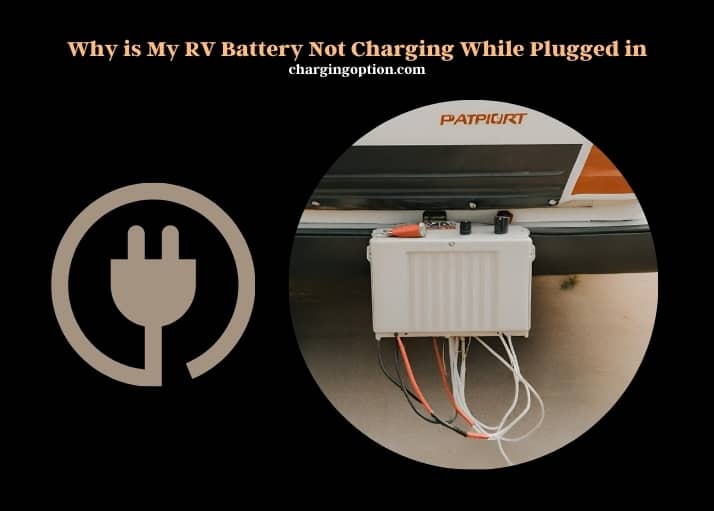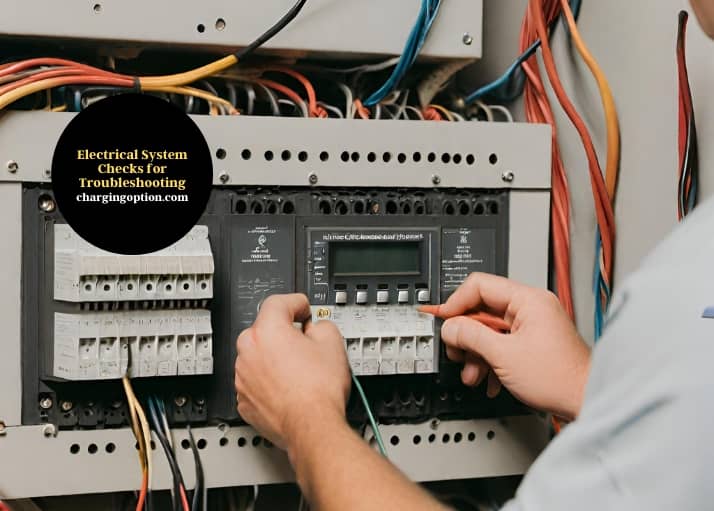RV batteries may not charge while plugged in due to issues like faulty connections, malfunctioning converters, or inappropriate power sources. These problems can prevent the flow of electricity needed to charge the battery effectively.
RV battery charging issues are often multifaceted, requiring a thorough understanding of the RV’s electrical system. Faulty connections, such as loose or corroded wires, are common culprits. These can disrupt the flow of electricity, making it impossible for the battery to charge. The converter, which transforms AC power to DC power suitable for charging the battery, can also fail. This failure might stem from internal damage or overheating, leading to inadequate charging.

Another factor to consider is the age and condition of the battery itself. Over time, batteries lose their capacity to hold a charge, especially if not properly maintained. Regular checks for water levels (in lead-acid batteries) and ensuring the terminals are clean and tight can extend battery life.
The power source plays a significant role. An improper power source, such as a damaged shore power cable or an incompatible power outlet, can lead to inconsistent or insufficient charging.
Environmental factors like extreme temperatures can affect battery performance. Both excessive heat and cold can hinder the chemical reactions necessary for charging. Keeping the battery within a moderate temperature range can help maintain its charging efficiency. These aspects is crucial for diagnosing and resolving RV battery charging issues.
Diagnosing RV Battery Charging Problems
RV battery charging issues can stem from various sources. Faulty connections are a primary suspect; these include loose or corroded terminals that impede current flow. A malfunctioning converter, a critical component that converts AC power to DC power to charge the battery, can also be at fault. If the converter is not functioning correctly, it fails to provide the necessary power to the battery.
Depleted batteries, especially those past their prime, struggle to hold a charge. This issue is exacerbated by improper power sources that may not deliver the correct voltage or current.
Damaged wiring within the RV’s electrical system can lead to charging failures. These wires, if frayed or broken, disrupt the flow of electricity, preventing the battery from charging effectively.
The Converter’s Role in Charging
The converter in an RV plays a pivotal role in ensuring the battery charges correctly. It converts the 120-volt AC power from external sources to 12-volt DC power, suitable for charging the RV battery. When this converter malfunctions, it directly impacts the battery’s ability to charge.
Symptoms of a failing converter include unusual noises, overheating, and the battery not charging when plugged in. To diagnose converter issues, one should check for output voltage and inspect for visible damage. Regular maintenance, such as cleaning dust and debris and ensuring adequate ventilation, can prolong the converter’s life.
Common RV Converter Problems and Solutions
| Problem | Symptoms | Solutions |
| Overheating | Excessive heat, smell of burning | Ensure proper ventilation, check for obstructions |
| Low Output Voltage | Battery not charging fully | Test with a multimeter, replace if necessary |
| Electrical Shorts | Tripping breakers, flickering lights | Inspect wiring, repair or replace damaged parts |
Battery Age and Maintenance Impact
The age and maintenance of an RV battery significantly influence its charging efficiency. As batteries age, their capacity to hold a charge diminishes. Regular maintenance, such as checking fluid levels and cleaning terminals, can extend a battery’s life.
Signs of aging batteries include slow cranking, dimming lights, and the need for frequent recharges. To prevent these issues, it’s advisable to follow a routine maintenance schedule, including regular inspections and timely replacements.
Electrical System Checks for Troubleshooting
A thorough inspection of the RV’s electrical system is crucial for identifying battery charging issues. Using a multimeter, one can check for proper voltage and current output. This tool is invaluable for diagnosing problems like short circuits or faulty wiring.

The inspection should include a check of all connections and components, from the battery terminals to the converter and power source. Identifying and rectifying electrical faults early can prevent more significant issues down the line.
Upgrading Your RV Charging System
Upgrading the RV charging system can enhance performance and reliability. Advanced charging technologies offer more efficient and faster charging capabilities. Before upgrading, it’s essential to consider compatibility with existing systems and the specific power needs of your RV.
Installation of a new system should be done with care, following manufacturer guidelines. An upgraded system can provide peace of mind and ensure that your RV battery charges effectively and reliably.
Pros and Cons of Different RV Battery Charging Systems
| Charging System Type | Pros | Cons |
| Standard Lead-Acid Charger | Cost-effective, widely available | Slower charging, requires maintenance |
| Smart Charger | Efficient, prolongs battery life | Higher cost, complex installation |
| Solar Charger | Eco-friendly, low operating cost | Dependent on weather, initial setup cost |
FAQs
Is a Blown Fuse Affecting My RV Battery Charging?
Blown fuses are often overlooked yet common culprits in RV battery charging issues. These fuses, designed to protect the electrical circuit, can blow due to overcurrent or short circuits. If a fuse related to the charging system blows, it interrupts the flow of electricity, preventing the battery from charging.
Checking and replacing blown fuses is a straightforward task. It’s advisable to inspect the fuse box for any signs of damaged fuses and replace them as needed. Regularly monitoring and maintaining the fuse box can preemptively solve many charging problems.
Could Incorrect Battery Type Selection Be the Problem?
Selecting the wrong type of battery for an RV can lead to charging issues. Different RVs require different types of batteries, such as deep-cycle, starter, or dual-purpose batteries. Each type has unique charging requirements and capacities.
Using a battery not suited for your RV’s charging system can result in inefficient charging or even damage to the battery. It’s crucial to consult your RV’s manual or a professional to ensure you’re using the correct battery type, which will optimize charging efficiency and prolong battery life.
Does Temperature Impact RV Battery Charging?
Temperature extremes can significantly impact RV battery charging. Both high and low temperatures affect a battery’s chemical processes, potentially leading to undercharging or overcharging. In cold conditions, batteries tend to charge slower and may not reach full capacity.
Conversely, high temperatures can cause batteries to overcharge, leading to reduced lifespan and efficiency. Monitoring the battery’s temperature and ensuring it’s within the recommended range can help maintain optimal charging conditions. Using temperature-compensated chargers or maintaining a stable environment for the battery can mitigate these issues.
Are Inverter Issues Preventing Battery Charging?
Inverters, which convert DC power from the battery to AC power for use in the RV, can also affect charging. If an inverter is malfunctioning or incorrectly installed, it can drain the battery instead of charging it. Symptoms of inverter issues include the RV’s electrical appliances not functioning correctly or the battery draining rapidly.
Regular inspection and maintenance of the inverter, along with ensuring proper installation, are key to preventing these issues. If problems persist, consulting a professional or considering a replacement might be necessary.
Could a Faulty Shore Power Source Be the Cause?
The shore power source, or external power supply, plays a crucial role in charging RV batteries. If this power source is faulty or provides inconsistent power, it can lead to charging issues. Signs of a problematic shore power source include flickering lights in the RV or the battery not charging despite being plugged in.
It’s important to inspect the shore power cable and connection for any damage or wear. Using a surge protector can also help safeguard against inconsistent power supply and potential damage.
Is My RV’s Battery Isolator Working Properly?
Battery isolators in RVs ensure that multiple batteries charge correctly without draining each other. If the isolator is faulty, it can prevent the house battery from charging while the RV is plugged in or while the engine is running.
Symptoms of a failing isolator include one battery being overcharged while the other remains undercharged. Regular checks and maintenance of the battery isolator, including ensuring clean and tight connections, can prevent these issues. If the isolator is found to be defective, replacing it is often the best solution.
Summary
RV battery charging issues can arise from various factors, including faulty connections, aging batteries, and malfunctioning converters. Regular maintenance and timely upgrades can significantly improve charging efficiency. The intricacies of your RV’s electrical system and the role of each component is key to ensuring a smooth and enjoyable RV experience.
